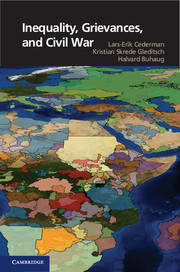1 - Introduction
Published online by Cambridge University Press: 05 June 2014
Summary
Do grievances cause civil war? The desperate struggles of discriminated and stateless peoples around the world suggest that the answer to this question must be affirmative, as illustrated by such cases as the Palestinians in the West Bank and Gaza, the Fur in the Sudan, the Tamils in Sri Lanka, the Karen in Myanmar, and the Kurds in Turkey and elsewhere. Indeed, the upheavals in North Africa and the Middle East in 2011 demonstrate that it is difficult to sustain regimes that exclude large parts of the population from political power along ethnic or nonethnic lines.
In stark contrast to these observations, however, much of the contemporary literature on civil war takes a very different view. Regarding explanations rooted in political and economic grievances with suspicion, leading scholars of civil war typically give short shrift to grievance-based accounts on the basis of results indicating that ethnic diversity and unequal individual wealth distributions have no statistically distinguishable relationship to internal conflict. In particular, ethnic grievances as triggers of civil wars receive little support in this literature, despite their having attracted substantial attention in qualitative studies. Arguing that grievances are the product, rather than a cause, of violence, or otherwise so omnipresent that they cannot account for civil conflict, these authors question the sincerity of political entrepreneurs’ appeals to ethnic nationalism, dismissing them as the opportunistic and self-serving arguments of warlords, thugs, and criminals.
- Type
- Chapter
- Information
- Inequality, Grievances, and Civil War , pp. 1 - 8Publisher: Cambridge University PressPrint publication year: 2013

